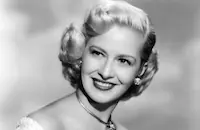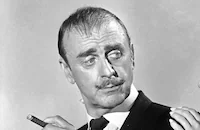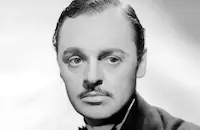Critic's Choice

Brief Synopsis
Cast & Crew
Don Weis
Bob Hope
Lucille Ball
Marilyn Maxwell
Rip Torn
Jessie Royce Landis
Film Details
Technical Specs

Synopsis
Broadway drama critic Parker Ballantine is horrified when his wife, Angela, announces that she wants to write a play about her mother and her four zany sisters. Although Parker calls the completed script a disaster, Angela manages to find both a producer and director. While the play is in Boston for tryouts, the nervous Angela begs Parker to disqualify himself as a critic. After quarreling with Angela over director Dion's attentions to her, Parker gets drunk with his ex-wife Ivy, and staggers into the theater. The reviews are all unfavorable, and Parker's is the most vitriolic. The wounded Angela threatens to leave with Dion, but Parker affects a reconciliation by apologizing for his behavior--but not his review--and persuading his wife that he still loves her.

Director
Don Weis
Cast

Bob Hope

Lucille Ball

Marilyn Maxwell

Rip Torn

Jessie Royce Landis

John Dehner

Jim Backus
Rick Kelman
Dorothy Green

Marie Windsor
Evan Mccord
Richard Deacon
Joan Shawlee

Jerome Cowan
Donald Losby
Lurene Tuttle
Ernestine Wade
Stanley Adams
Crew
Gordon Bau
Edward Carrere
George Duning
Edith Head
Stanley Jones
William L. Kuehl
Irma Kusley
Charles Lang
Russell Llewellyn
Arthur Morton
Jean Burt Reilly
Frank P. Rosenberg
Jack Sher
William Ziegler

Videos
Movie Clip



Trailer
Hosted Intro
Film Details
Technical Specs

Articles
Critic's Choice
The filming of Critic's Choice began in March 1962, not long after Lucille Ball had divorced husband Desi Arnaz and married comic Gary Morton. During the shooting, she shuttled between the Las Vegas Dunes hotel for weekends and flew to Houston to watch Morton perform at the Shamrock. The set itself was like a Vegas nightclub with all the celebrities who wanted to come and watch Ball and Hope. Peter Lawford, his wife Pat Kennedy, and his mother, the Duchess of Devonshire, were among them. Kennedy and columnist Walter Winchell were given bit parts in the film but visitor's hours had to be established to maintain the shooting schedule.
Hope and Ball worked well together. As Kathleen Brady wrote, "[T]he public took it for granted that they were personal friends, as were [George] Burns and [Jack] Benny or [Bob] Hope and [Bing] Crosby. Now that Desi would no longer do as her escort, whenever she appeared on television and needed to be paired at the podium with a male star, chiefly at the Academy Awards shows, Hope's would be the arm she took. They were the Annette and Frankie of the D-Day generation, and as such they inspired wild cheering. They liked each other enormously and they were delighted with the effect they had together on audiences. 'We were friends because we had such success together, and that means a lot.' Bob Hope said. 'We never had a romance. Nothing after hours. That's how close we were.'"
Despite the chemistry of the co-stars, Critic's Choice was not a box-office success when it opened on April 3, 1963. The studio had put it on the shelf for months after the audience reaction at preview screenings was so disastrous. By 1963, Ball had a new television series and the studio released the film to capitalize on it. It didn't help. The film performed poorly at the box-office. Real-life critics blamed the script, which had Hope and Ball arguing throughout. The New York Daily News noted, "Most of the picture's running time is taken up with the couple's quarrels and these are not conductive to laughter," while The New York Times blamed director Don Weis, "[who] has tried to upholster the shaky plot with slapstick and broad burlesque. Both stars, old hands at this sort of thing, go through their paces with benign good humor, but their subtler comic talents remain untapped."
Producer: Frank P. Rosenberg
Director: Don Weis
Screenplay: Jack Sher; Ira Levin (play)
Cinematography: Charles Lang
Art Direction: Edward Carrere
Music: George Duning
Film Editing: William H. Ziegler
Cast: Bob Hope (Parker Ballantine), Lucille Ball (Angela Ballantine), Marilyn Maxwell (Ivy London), Rip Torn (Dion Kapakos), Jessie Royce Landis (Charlotte Orr aka Charlie), John Dehner (S.P. Champlain), Jim Backus (Dr. William Von Hagedorn), Ricky Kelman (John Ballantine), Dorothy Green (Mrs. Margaret Champlain), Marie Windsor (Sally Orr), Evan McCord (Philip 'Phil' Yardley), Joan Shawlee (Marge Orr), Richard Deacon (Harvey Rittenhouse), Jerome Cowan (Joe Rosenfield).
C-100m.
by Lorraine LoBianco
SOURCES:
The AFI Catalog of Feature Films
Brady, Kathleen Lucille: The Life of Lucille Ball
De La Hoz, Cindy Lucy at the Movies
Kanfer, Stefan Ball of Fire: the Tumultuous Life and Comic Art of Lucille Ball
Quirk, Lawrence J. Bob Hope: The Road Well Traveled

Critic's Choice
Quotes
For the record, Sisters Three was written by Angela Ballantine, directed by Dion Kapakos, and produced by mistake.- John Ballantine
Trivia
Miscellaneous Notes
Released in United States 1963
Released in United States 1963















